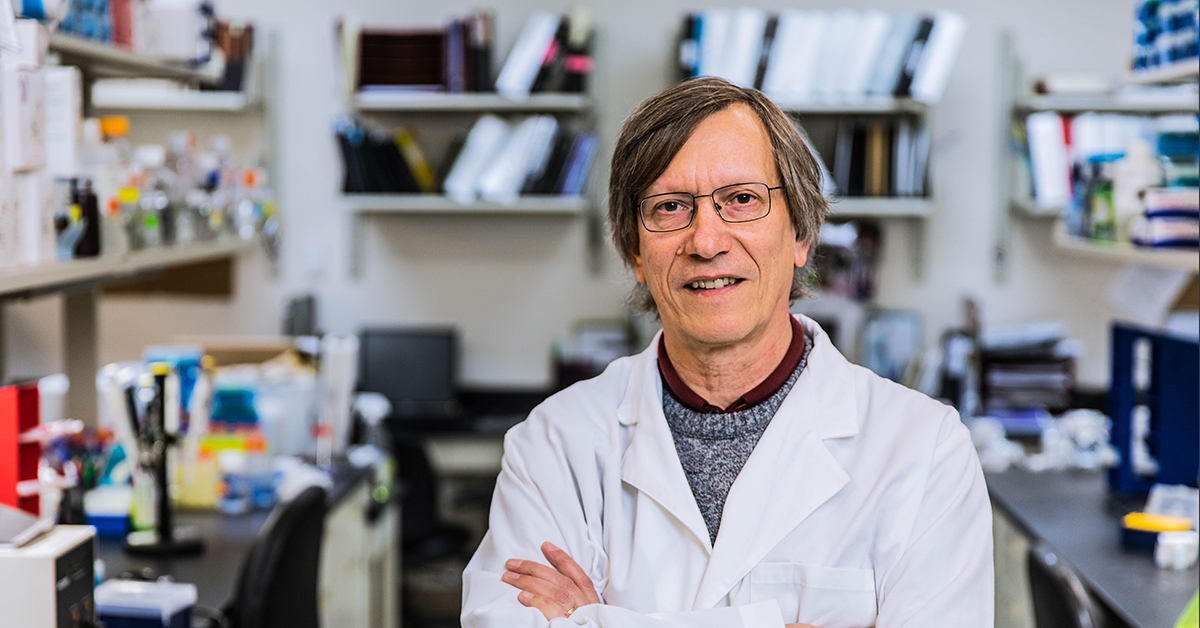From Neurosurgery to Biomedical Science
Guillermo Altenberg, M.D., Ph.D., finds his passion in research

Guillermo Altenberg, M.D., Ph.D. is the Department Chair of Cell Physiology and Molecular Biophysics.
As a boy growing up in the suburbs of Buenos Aires, Argentina, Guillermo Altenberg,
M.D., Ph.D., recalls always wanting to be a doctor.
“Actually, I had the idea of becoming a neurosurgeon, but once I was at the School
of Medicine of the University of Buenos Aires I got progressively more interested
in mechanisms, and rapidly my mind moved from neurosurgery to biomedical science,”
Altenberg recalls.
Medical school in Argentina typically last six years, and combined degree programs
like the M.D./Ph.D. offered at TTUHSC do not exist. Undeterred, Altenberg eventually
earned his M.D. from the University of Buenos Aires School of Medicine and his Ph.D.
from the university’s Institute of Cardiological Research. He also spent more than
four years as a volunteer medical student in one of the university’s nephrology labs
investigating renal physiology and pathophysiology, which spurred his interest in
membrane transport and the structure and function of membrane proteins.
“It happens that the basic functional unit of the kidneys, the nephron, depends critically
on transport across the membranes of the cells that form the renal tubules,” Altenberg
says. “It is not possible to understand the kidneys without membrane transport.”
Upon completing his studies in Argentina, Altenberg accepted a postdoctoral fellowship
to continue studying membrane transport in epithelia and biophysics at the University
of Texas Medical Branch in Galveston (UTMB-Galveston). He began expanding his independent
research into more detailed studies of the mechanistic characteristics of membrane
proteins.
Altenberg’s research interests eventually evolved to include studies on the structure,
function and regulation of membrane proteins, and the development of new nanotechnologies
based on synthetic membranes, including polymer-based nanodiscs.
“Among membrane proteins, we focus our studies on connexins, which form cell-to-cell
communication channels and multidrug-resistance proteins that export anticancer agents
from tumor cells,” Altenberg says.
In late 2006, Altenberg’s postdoctoral mentor, Luis Reuss, M.D., was considering moving
to TTUHSC to chair the Department of Physiology. Reuss convinced Altenberg it was
an opportunity to build a strong and unique research program focused on membrane proteins
because the department had to be rebuilt. Altenberg then left his position as an assistant
professor of internal medicine at UTMB-Galveston and headed to Lubbock and TTUHSC’s
Department of Cell Physiology and Molecular Biophysics. He was promoted to professor
in 2011 and was named department chair in 2014.
With the university’s support, Reuss and Altenberg recruited new faculty between 2007
and 2015 to create a critical mass of membrane protein research that reached across
departments and spread to Texas Tech University via the Center for Membrane Protein
Research. Altenberg served as the center’s director during 2014-2015.
“Looking back, the move from UTMB at Galveston to TTUHSC was an excellent choice,”
Altenberg says. “More than 10 years of hard work yielded a membrane protein research
group in West Texas that has earned national and international recognition.”
When he takes a break from the laboratory, Altenberg enjoys spending time with his
family. His wife, Patricia Aristimuno, M.D., is an associate professor for the TTUHSC
Department of Internal Medicine in the nephrology division. His daughter, Victoria,
has just started college and wants to pursue a career as a pharmacist. He also enjoys
going back to Argentina when time allows to visit the rest of his family in the Buenos
Aires area and in the picturesque Patagonia region of southern Argentina.
“Besides spending time with my family, I like to play outdoor soccer,” Altenberg says.
“I have played soccer from a very young age, and although I cannot play as much as
I used to, I still do play twice a week with TTU students. I also like to play guitar;
I most frequently play late at night, in my home office, when I take breaks from work.”
Related Stories
Celebrating Veterans: TTUHSC’s General Martin Clay’s Legacy of Service and Leadership
From his initial enlistment in the Army National Guard 36 years ago to his leadership in military and civilian health care management roles, Major General Martin Clay’s career has been shaped by adaptability, mission focus and service to others.
Texas Tech University Health Sciences Center School of Nursing Named Best Accelerated Bachelor of Science in Nursing Program in Texas
The TTUHSC School of Nursing Accelerated Bachelor of Science in Nursing (BSN) program has been ranked the No. 1 accelerated nursing program in Texas by RegisteredNursing.org.
TTUHSC Names New Regional Dean for the School of Nursing
Louise Rice, DNP, RN, has been named regional dean of the TTUHSC School of Nursing on the Amarillo campus.
Recent Stories
National Academy of Inventors Names TTUHSC Faculty Senior Members
The National Academy of Inventors (NAI) has designated two current and one former TTUHSC faculty researchers as Senior Members.
The John Wayne Cancer Foundation Surgical Oncology Fellowship Program at Texas Tech University Health Sciences Center Announced
TTUHSC is collaborating with the John Wayne Cancer Foundation and has established the Big Cure Endowment, which supports the university’s efforts to reduce cancer incidence and increase survivability of people in rural and underserved areas.
TTUHSC Receives $1 Million Gift from Amarillo National Bank to Expand and Enhance Pediatric Care in the Panhandle
TTUHSC School of Medicine leaders accepted a $1 million philanthropic gift from Amarillo National Bank on Tuesday (Feb. 10), marking a transformational investment in pediatric care for the Texas Panhandle.
